Riley Bailey
Ukrainian forces made tactically significant advances in western Zaporizhia Oblast amid continued counteroffensive operations on at least three sectors of the front on August 11. Geolocated footage published on August 11 confirms that Ukrainian forces reached the northern outskirts of Robotyne (10km south of Orikhiv) in western Zaporizhia Oblast, though the permanence and extent of these positions are currently unclear.[1] Ukrainian forces have conducted regular ground attacks towards Robotyne for weeks as part of their operations aimed at degrading Russian defenses. The Ukrainian forces’ ability to advance to the outskirts of Robotyne — which Russian forces have dedicated significant effort, time, and resources to defend — remains significant even if Ukrainian gains are limited at this time. Geolocated footage published on August 11 shows that Ukrainian forces advanced into Urozhaine (9km south of Velyka Novosilka) along the Donetsk-Zaporizhia Oblast border area. Russian milbloggers claimed that Ukrainian forces pushed Russian forces back into the settlement on August 10 and 11.[2] The Ukrainian General Staff reported that Ukrainian forces continued counteroffensive operations in the Bakhmut, Berdyansk (Donetsk-Zaporizhia Oblast border area), and Melitopol (western Zaporizhia Oblast) directions.[3]
Ukrainian counteroffensive operations appear to be forcing the Russian military to laterally redeploy Russian forces defending in western Zaporizhia Oblast, indicating that the Ukrainian effort there may be significantly degrading Russian defenses. Russian milbloggers claimed on August 11 that elements of the 7th Guards Airborne (VDV) Division are involved in heavy fighting near Robotyne in western Zaporizhia Oblast, and Chechen Republic Head Ramzan Kadyrov claimed on August 10 that elements of the “Vostok Akhmat” Battalion are now defending near Robotyne.[4] Elements of the 58th Combined Arms Army’s 42nd Motorized Rifle Division (Southern Military District) have been the primary Russian formation defending immediately south of Orikhiv since the start of the counteroffensive, with elements of the 22nd and 45th Separate Guards Spetsnaz (Russian General Staff Main Directorate) brigades and the 810th Naval Infantry Brigade (Black Sea Fleet) supporting Russian defensive operations in the area.[5] The arrival of the 7th VDV Division and the Akhmat elements to the Robotyne area represents the first explicit commitment of new Russian formations and units to the area.
Kadyrov has consistently deployed Akhmat elements to perceived critical sectors of the frontline in order to earn favor from Russian President Vladimir Putin, and most recently deployed Akhmat Spetsnaz elements to the Klishchiivka area south of Bakhmut in response to Ukrainian advances in the area.[6] Russian sources claimed that elements of the 7th VDV deployed from east (left) bank Kherson Oblast to the Zaporizhia direction following the destruction of the Kakhovka Hydroelectric Power Station (KHPP) dam on June 6, and ISW later observed elements of the division defending against Ukrainian counteroffensive operations in the Staromayorske area along the administrative border between Zaporizhia and Donetsk oblasts in July.[7]
The 7th VDV Division is now split across at least two and possibly three axes of the front. Russian milbloggers offered diverging accounts on whether elements of the 7th VDV Division withdrew entirely from the Staromayorske area after Ukrainian forces captured the settlement on July 27.[8] Elements of the division have remained in Kherson Oblast to defend against Ukrainian activity on the left bank of the Dnipro River.[9] Elements of the 7th VDV division may have arrived in western Zaporizhia Oblast at an earlier date, although this is the first time that Russian sources have claimed that Russian command has committed these elements to fight in the area. Elements of the 42nd Motorized Rifle Division continue to defend near Robotyne and ISW has not observed any elements of the division withdrawing from the area, indicating that the arrival of the 7th VDV Division and Akhmat elements likely does not portend a rotation for the main Russian fighting force in the Orikhiv direction.[10] These likely lateral redeployments suggest that Ukrainian counteroffensive operations have significantly degraded existing defending Russian forces in the area and prompted the Russian command to send these elements to shore up Russian defenses in this critical sector of the frontline. The lack of Russian operational reserves means that the Russian command will have to conduct more lateral redeployments if they wish to reinforce certain sectors of the front in the future.[11]
Russia’s practice of conducting lateral redeployments to key sectors of the front will likely further weaken Russian defensive lines in aggregate, as both Russian and Ukrainian operations are fixing Russian units to certain sectors of the front. These lateral reinforcements will likely disrupt Russian offensive and defensive operations in the sectors from which they are drawn and threaten to rapidly degrade the forces that the Russian military is using as reinforcements.[12] Russia currently does not appear to possess significant available forces that it could draw on for reinforcements without endangering other sectors of the front. Ukrainian counteroffensive operations drew elite Russian formations and units to the Bakhmut area and continue to fix them there.[13] Russian forces have also committed a significant number of forces to localized offensives operations in the Kupyansk and Svatove areas, which aim to similarly draw Ukrainian forces away from areas of Ukrainian counteroffensive operations.[14] Even if the Russian command determines to end localized offensive pushes in these areas it would likely take some time for Russian forces to lower the tempo of their operations and withdraw forces for lateral redeployments without opening up areas of the front to successful Ukrainian counterattacks. The limited Russian lateral redeployment of elements of the 7th VDV Division from the left bank of Kherson Oblast in June appears to have set conditions that allowed Ukrainian forces to more freely operate in the area, and Ukrainian forces will likely similarly exploit weakened Russian groupings in other areas of the front where they are actively conducting offensive operations in the event of further Russian movements.[15]
Ukrainian forces on the other hand maintain reserves that allow them to rotate units instead of relying on redeploying units conducting defensive and offensive operations to other sectors of the line without rest.[16] Ukrainian forces likely therefore can maintain the necessary combat potential needed to continue degrading Russian forces defending southern Ukraine and the Bakhmut area while constraining Russian advances along the Kupyansk-Svatove-Kreminna line. Russian lateral redeployments will likely increase the likelihood that Russian forces would have to fall back to prepared defensive positions without significant support in the case of a Ukrainian breakthrough.[17] The further degradation of defending Russian forces thus creates opportunities for any Ukrainian breakthrough to be potentially decisive.[18]
Russian forces appear to be intensifying offensive operations northeast of Kupyansk, likely to draw Ukrainian forces away from more operationally significant areas of the front. A prominent Kremlin-affiliated milblogger claimed on August 10 that Russian offensives along the front line in the Kupyansk area forced Ukrainian forces to flee to Petropavlivka (7km east of Kupyansk) and claimed that Russian forces are threatening to collapse Ukrainian defenses in the area.[19] The milblogger predicted that Russian forces will take Petropavlivka in the next two days and continue advancing toward Kupyansk.[20] The milblogger claimed on August 11 that Russian forces have recently captured 30 Ukrainian ”strongholds” in the Kupyansk direction along a wide front from Kupyansk to Kyslivka (20km southeast of Kupyansk).[21] Another Russian milblogger claimed on August 10 that Russian forces entered the outskirts of Synkivka (9km northeast of Kupyansk) and are less than 10km away from Ukraine’s advanced defensive lines.[22] ISW has not observed visual confirmation of Russian claims of advances northeast of Kupyansk. Russian milbloggers have repeatedly made claims of extensive Russian advances southwest of Svatove and ISW has additionally not observed visual confirmation of those claims, despite those claims now being weeks old.[23] Russian forces may have increased offensive activity on the Kupyansk-Svatove-Kreminna line to take advantage of Ukraine’s operational focus elsewhere and to draw Ukrainian units away from more critical areas of the front. Ukrainian Eastern Group of Force Spokesperson Colonel Serhiy Cherevaty stated that Ukrainian forces have significantly strengthened defenses in the Kupyansk direction in recent days, indicating that Russian forces may have been successful in drawing additional Ukrainian forces to the area.[24] Ukrainian officials also announced mandatory evacuations for civilians in 53 settlements near Kupyansk on August 9 due to intensified Russian shelling and airstrikes posing increased risk for civilians, though the evacuations do not necessarily indicate that Ukrainian forces expect Russian forces to make significant advances.[25]
Russian forces conducted another series of missile strikes in Ukraine on August 11 and targeted a Ukrainian airfield for the second time in the last week. Ukrainian military sources reported that Russian forces launched four Kinzhal missiles and that Ukrainian air defenses intercepted one missile over Kyiv Oblast.[26] The Ukrainian Air Force claimed that the other Kinzhal missiles struck near the Kolomyia airfield in Ivano-Frankivsk Oblast.[27] Russian milbloggers claimed that Russian forces targeted the Starokostyantyniv airfield in Khmelnytskyi Oblast on August 6 because Ukrainian forces store foreign-supplied missiles including Storm Shadow cruise missiles at warehouses on the base.[28] Russia’s targeting of the Starokostyantyniv and Kolomyia airfields in the past week suggests that Russian forces are increasingly concerned about Ukraine’s interdiction campaign.
Russian sources claimed that the Wagner Group appears to be maintaining a presence at its facilities in Belarus, though the status of its rumored withdrawal to Russian remains unclear. A Russian milblogger posted satellite imagery captured on August 3 claiming to show that an additional 930 Wagner vehicles and 18 additional low-bed semi-trailers were present at the Wagner camp in Tsel, Asipovichy, Belarus compared to imagery from July 17.[29] The milblogger claimed that the imagery from August 3 shows that 40 shipping containers arrived and that unspecified construction is occurring at the camp.[30] The milblogger also claimed that the number of tents at the Wagner camp has not changed and that the number of cars present at the camp indicates that it is likely fully staffed.[31] Russian rumors about Wagner’s withdrawal from Belarus surfaced on August 8, so this additional satellite footage from August 3 does not completely refute those claims.[32] The footage does suggest that Wagner intended to expand its presence in Belarus and believed that elements of the deal ensuring its operations in the country were still in place as of August 3.
The Russian Ministry of Internal Affairs (MVD) is struggling with significant personnel shortages, especially in occupied territories in Ukraine, amid a broader power shift between other Russian internal security organs.[33] Russian Internal Affairs Minister Vladimir Kolokoltsev stated on August 10 that the MVD is struggling with a critical personnel shortage and that over 5,000 MVD personnel have left various MVD bodies within the past month.[34] Kolokoltsev stated in October 2022 that the MVD needs 52,000 police officers to adequately staff newly occupied territories in Ukraine by 2026, and stated in November 2022 that the current MVD shortage was 90,000 personnel.[35] Russian insider sources speculated that MVD employees are leaving due to corruption, poor payment, and performing as gendarmerie (military forces acting as civilian law enforcement).[36]
The Kremlin and Russian Ministry of Defense (MoD) are likely attempting to deflect blame for Ukrainian shelling in Russian border areas onto mid-level officers. A Moscow court will consider a criminal case against two Russian officers accused of failing to prevent a surprise attack on the Russian Federation, which violates Article 340 of the Russian Criminal Code.[37] Russian authorities have accused the officers of failing to prevent Ukrainian forces from shelling their units and military equipment in Belgorod Oblast in April 2022.[38] This will be the first time that a Russian court will consider such a case since the start of the full-scale invasion of Ukraine.[39]
Key Takeaways:Ukrainian forces made tactically significant advances in western Zaporizhia Oblast and reached the outskirts of Robotyne amid continued counteroffensive operations on at least three sectors of the front on August 11.
Ukrainian counteroffensive operations appear to be forcing the Russian military to laterally redeploy Russian forces defending in western Zaporizhia Oblast, indicating that the Ukrainian effort there may be significantly degrading Russian defenses.
Russia’s necessary practice of conducting lateral redeployments to key sectors of the front will likely further weaken Russian defensive lines in aggregate, as both Russian and Ukrainian operations are fixing Russian units to certain sectors of the front.
The further degradation of defending Russian forces creates opportunities for any Ukrainian breakthrough to be potentially decisive.
Russian forces appear to be intensifying offensive operations northeast of Kupyansk, likely to draw Ukrainian forces away from more operationally significant areas of the front.
Russian forces conducted another series of missile strikes in Ukraine on August 11 and targeted a Ukrainian airfield for the second time in the last week.
Russian sources claimed that the Wagner Group appears to be maintaining a presence at its facilities in Belarus, though the status of its rumored withdrawal to Russian remains unclear.
The Russian Ministry of Internal Affairs (MVD) is struggling with significant personnel shortages, especially in occupied territories in Ukraine, amid a broader power shift between other Russian internal security organs.
The Kremlin and Russian Ministry of Defense (MoD) are likely attempting to deflect blame for Ukrainian shelling in Russian border areas onto mid-level officers.
Russian forces conducted offensive operations along the Kupyansk-Svatove-Kreminna line, near Bakhmut, on the Avdiivka-Donetsk City line, and in the Donetsk-Zaporizhia Oblast area on August 11 and advanced in some areas.
Ukrainian forces conducted offensive operations on at least three sectors of the front on August 11 and advanced in the western Donetsk-eastern Zaporizhia Oblast border area and in western Zaporizhia Oblast.
The Russian defense industrial base (DIB) has begun producing “Geran-2” drones, a modified version of the Iranian-produced Shahed-131/136 drone that will likely enable Russia‘s ability to maintain or potentially increase the frequency of Russia’s drone strikes on Ukraine.
Russian occupation authorities are taking steps to make the upcoming regional elections in the Russian occupied territories appear to be fair and competitive.
We do not report in detail on Russian war crimes because these activities are well-covered in Western media and do not directly affect the military operations we are assessing and forecasting. We will continue to evaluate and report on the effects of these criminal activities on the Ukrainian military and the Ukrainian population and specifically on combat in Ukrainian urban areas. We utterly condemn these Russian violations of the laws of armed conflict, Geneva Conventions, and humanity even though we do not describe them in these reports.Russian Main Effort – Eastern Ukraine (comprised of two subordinate main efforts)
Russian Subordinate Main Effort #1 – Capture the remainder of Luhansk Oblast and push westward into eastern Kharkiv Oblast and encircle northern Donetsk Oblast
Russian Subordinate Main Effort #2 – Capture the entirety of Donetsk Oblast
Russian Supporting Effort – Southern Axis
Russian Mobilization and Force Generation Efforts
Activities in Russian-occupied areas
Russian Main Effort – Eastern Ukraine
Russian Subordinate Main Effort #1 – Luhansk Oblast (Russian objective: Capture the remainder of Luhansk Oblast and push westward into eastern Kharkiv Oblast and northern Donetsk Oblast)
Russian forces continued offensives operations northeast of Kupyansk and reportedly advanced on August 11. The Ukrainian General Staff reported that Russian forces conducted unsuccessful offensive actions near Synkivka (9km northeast of Kupyansk) and Ivanivka (21km southeast of Kupyansk).[40] The Russian MoD claimed that elements of the Russian Western Grouping of Forces continued offensive operations along a wide front in the Kupyansk direction and improved their tactical situation near Vilshana (15km northeast of Kupyansk) and Pershotravneve (21km east of Kupyansk).[41] Russian milbloggers claimed that Russian forces advanced near Synkivka and Ivanivka on August 11, and one milblogger claimed that Russian forces entered the northern outskirts of Synkivka on August 10.[42]
Russian sources claimed that Ukrainian forces conducted counterattacks northeast of Kupyansk but did not advance on August 11. The Russian MoD reported that Russian forces repelled Ukrainian counterattacks near Synkivka and the Mankivka tract (15km east of Kupyansk).[43]
Russian forces continued offensive operations along the Svatove-Kreminna line on August 11 but made no confirmed gains. The Ukrainian General Staff reported that Russian forces conducted unsuccessful offensive operations near Nadiya (15km west of Svatove) and south of Novoselivske (15km northwest of Svatove).[44] A Russian milblogger claimed that Russian forces stormed Ukrainian positions on the Torske-Yampolivka line (15km to 17km west of Kreminna) and made marginal advances in the area.[45] A Russian milblogger amplified footage on August 10 purporting to show elements of Chechen Akhmat Spetsnaz and units of the 2nd Luhansk People’s Republic (LNR) Army Corps conducting an assault in the Serebryanske forest area south of Kreminna.[46]
Russian sources claimed that Ukrainian forces conducted unsuccessful ground attacks along the Svatove-Kreminna line on August 11. The Russian MoD claimed that elements of the Russian Central Grouping of Forces repelled Ukrainian assaults near Novoselivske, Novoyehorivka (15km southwest of Svatove), and Kreminna in Luhansk Oblast and Bilohorivka, Donetsk Oblast (33km south of Kreminna).[47] Russian milbloggers claimed that Russian forces repelled Ukrainian attacks along the Raihorodka-Karmazynivka line (13km west to 13km southwest of Svatove), in the Zhuravka Balka area northwest of Kreminna, near Chervonopopivka (6km north of Kreminna), near Dibrova (5km southwest of Kreminna), and in the Serebryanske forest area south of Kreminna.[48]
Russian Subordinate Main Effort #2 – Donetsk Oblast (Russian Objective: Capture the entirety of Donetsk Oblast, the claimed territory of Russia’s proxies in Donbas)
Ukrainian forces conducted offensive operations near Bakhmut but did not advance on August 11. The Ukrainian General Staff reported that Ukrainian forces continued offensive actions in the Bakhmut area.[49] A Russian milblogger claimed that Ukrainian forces conducted sabotage and reconnaissance operations near Yahidne (2km north of Bakhmut) and Berkhivka.[50] Other Russian milbloggers claimed that Ukrainian forces attempted to break through Russian defenses near Klishchiivka.[51]
Russian forces conducted offensive operations near Bakhmut and made some advances on August 11. Geolocated footage published on August 11 indicates that Russian forces advanced southwest towards the Berkhivka reservoir (6km northwest of Bakhmut).[52] Russian milbloggers claimed Russian forces improved their positions near Andriivka (10km southwest of Bakhmut) and made limited advances south of Klishchiivka on August 10.[53] Multiple Russian milbloggers claimed that Russian forces attacked near Klishchiivka on August 11.[54]
The Russian MoD claimed that Ukrainian forces conducted offensive operations along the Avdiivka-Donetsk City line but did not advance on August 11. The Russian MoD claimed that Ukrainian forces unsuccessfully attacked near Nevelske (14km southwest of Avdiivka), Staromykhailivka, Malynivka (24km northwest of Bakhmut), and Vesele (5km northeast of Avdiivka).[55]
Russian forces conducted offensive operations along the Avdiivka-Donetsk City line and slightly advanced on August 11. Geolocated footage published on August 11 indicates that Russian forces made marginal advances north of Staromykhailivka (19km southwest of Avdiivka).[56] The Ukrainian General Staff reported that Russian forces conducted unsuccessful offensive actions near Avdiivka, Marinka (on the western outskirts of Donetsk City), Krasnohorivka (23km southwest of Avdiivka), and Novomykhailivka (10km southwest of Donetsk City).[57] A Russian milblogger claimed that Russian forces took control of parts of the Trudovske Mine near Krasnohorivka.[58] Another Russian milblogger claimed that elements of the Donetsk People’s Republic (DNR) “Pyatnashka” International Brigade established fire control over the road between Orlivka (8km west of Avdiivka) and Lastochkyne (6km west of Avdiivka) that serves as the Ukrainian ground line of communication (GLOC) in the Avdiivka area.[59] This claim, however, is likely false given that another milblogger made the same claim about the same Russian unit on July 27 and there are currently no indications that Russian forces are interdicting significant Ukrainian GLOCs in the Avdiivka area.[60] Russian milbloggers routinely claimed in the winter and spring of 2023 that Russian forces had fire control over Ukrainian GLOCs around Bakhmut long before they likely did.[61]
Russian Supporting Effort – Southern Axis (Russian objective: Maintain frontline positions and secure rear areas against Ukrainian strikes)
Ukrainian forces reportedly conducted limited offensive operations in western Donetsk Oblast and did not advance on August 11. The Russian MoD claimed that Russian forces repelled a Ukrainian ground attack near Mykilske (27km southwest of Donetsk City).[62]
Ukrainian forces continued offensive operations in the Donetsk-Zaporizhia Oblast border area and advanced on August 11. Geolocated footage published on August 11 shows that Ukrainian forces advanced into Urozhaine (9km south of Velyka Novosilka), and Russian milbloggers claimed that Ukrainian forces control the northern half of the settlement while Russian forces maintain control over the southern half of the settlement.[63] The Russian “Vostok” volunteer battalion, which is reportedly defending Urozhaine, acknowledged that Ukrainian forces pushed Russian forces back by a few unspecified streets in Urozhaine.[64] Some Russian milbloggers maintained that Ukrainian forces only captured positions on the outskirts of Urozhaine, however.[65] Russian milbloggers also reported continued fighting near Staromayorske (9km south of Velyka Novosilka).[66] One Russian milblogger claimed that Russian forces are struggling to evacuate wounded personnel from the 37th Separate Guards Motorized Rifle Brigade (36th Combined Arms Army, Eastern Military District) from Urozhaine due to Ukrainian artillery strikes against Russian vehicles.[67]
Russian forces continued to conduct limited offensive operations in the Donetsk-Zaporizhia Oblast border area and did not make any claimed or confirmed advances on August 11. The Ukrainian General Staff reported that Russian forces conducted unsuccessful attempts to recapture lost positions west of Staromayorske and near Urozhaine.[68]
Ukrainian forces continued offensive operations and advanced up to the outskirts of Robotyne (10km south of Orikhiv) in western Zaporizhia Oblast on August 11. Geolocated footage published on August 11 shows that Ukrainian forces reached the entrance to Robotyne, though the extent and permanence of their positions in the area remain unclear.[69] A Russian milblogger claimed that Ukrainian forces expanded their area of control along a six-kilometer wide front and slightly in depth near Robotyne.[70] Russian sources claimed that Russian forces repelled Ukrainian ground attacks on the Robotyne-Verbove line (up to 18km southeast of Orikhiv).[71] A Russian milblogger claimed that Russian forces pushed Ukrainian forces back 1.5 kilometers near Robotyne while repelling a Ukrainian attack on August 10.[72]
Ukrainian forces reportedly conducted operations in near rear areas in the occupied east (left) bank of Kherson Oblast on August 11. A Russian milblogger posted footage on August 11 of a Russian soldier claiming that Ukrainian forces captured the western half of Kozachi Laheri.[73] Another Russian milblogger claimed that a 30 person Ukrainian sabotage and reconnaissance group conducted a limited raid against a Russian brigade convoy on a section of the E58 highway between Rozdolne and Vilne, roughly 8km south of Nova Kakhovka.[74] ISW has not observed visual confirmation of either of these claims and continues to assess that any Ukrainian positions in the east bank of Kherson Oblast are limited.
The International Atomic Energy Agency (IAEA) announced that the Zaporizhzhia Nuclear Power Plant (ZNPP) will transfer reactor no 4. from a hot shutdown to a cold shutdown and reactor no. 6 from a cold shutdown to a hot shutdown to repair a water leak from a steam generator.[75] Ukrainian nuclear energy agency Energoatom reported that Russian occupation authorities transferred reactor no. 4 to a hot shutdown state in breach of Ukrainian guidelines, resulting in the leak.[76] The IAEA also reported that the main external power line to the ZNPP experienced two interruptions during the day on August 10.[77] The Ukrainian Ministry of Energy reported that Russian forces shelled the power line and caused the power disruption.[78]
Russian and occupation authorities continue to struggle to mitigate traffic issues from Ukrainian strikes against bridges in occupied Crimea. A Russian source claimed that traffic stopped on the Kerch Strait Bridge, creating a line of 600 cars and a two-hour waiting time to cross the bridge in an unspecified direction.[79] Footage published on August 10 shows a long line of cargo vehicles in traffic reportedly near Krasnoperekopsk, at the intersection of the H05 and E97 highways in occupied Crimea.[80] Kherson Oblast occupation head Vladimir Saldo announced on August 11 that repairs to the Chonhar Bridge will take at least one month after recent Ukrainian strikes damaged the bridge.[81] Satellite imagery suggests that Russian forces constructed a pontoon bridge next to the Chonhar Bridge between August 4 and 9.[82] Ukrainian Kherson Oblast military advisor Serhiy Khlan stated on August 10 that Russian forces are moving military equipment away from the east (left) bank of the Dnipro River to Henichesk, Kherson Oblast due to fears of further Ukrainian strikes on bridges and are diverting civilian traffic in favor of military logistics in the area.[83]
Russian Mobilization and Force Generation Efforts (Russian objective: Expand combat power without conducting general mobilization)
The Russian defense industrial base (DIB) has begun producing Geran-2 drones, a modified version of Iranian Shahed 131/136 drones that Iran previously produced domestically and will likely enable Russia to maintain or potentially increase the frequency of drone strikes against Ukraine. Conflict Armament Research (CAR) reported on August 10 that its investigators inspected the wreckage of two Russian-produced Shahed drones used in southeastern Ukraine in July and determined that modifications on the two drones indicate that Russia has begun producing its own modified version of the Shahed-131/136 drone.[84] CAR reported that Russia’s production of modified drones marks a significant evolution in Russia’s drone capabilities that will allow Russia to sustain its reliance on single-use drones.[85] CAR reported its investigators concluded that the drones were produced in Russia rather than in Iran based on modifications to the drone’s airframe construction and the drone’s internal navigation units.[86] Ukrainian Southern Operational Command Spokesperson Captain First Rank Nataliya Humenyuk reported on July 26 that Ukrainian forces found Cyrillic markings on Russian-launched Shahed drones, indicating that Russian forces are already using Russian-produced Shaheds despite Western estimates that Russia’s drone factory in Yelabuga, Republic of Tatarstan would not be ready before early 2024.[87] ISW assessed at that time that Humenyuk’s report indicated that Russia was likely further along in the drone production process than publicly available Western intelligence suggested.[88]
Russian authorities are reportedly writing off the debts of penal recruits who sign Russian MoD contracts. Russian opposition news outlet Verstka stated that an inmate serving a sentence in a prison colony in Bezhetsk, Tver Oblast claimed that the Russian MoD is promising to repay the debts of prisoners who sign contracts with the Russian MoD and agree to serve in Storm-Z detachments.[89] Verstka reported that the Russian MoD is instructing Russian courts to forgive the debts of Storm-Z recruits in exchange for their service in the war in Ukraine.[90] Verstka reported that a Russian court forgave 639,000 rubles ($6,440) of debt for one Storm-Z soldier from the Russian 71st Guards Motorized Rifle Regiment (42nd Motorized Rifle Division, 58th Combined Arms Army, Southern Military District), some of which was related to criminal cases against the solider.[91]
Activities in Russian-occupied areas (Russian objective: Consolidate administrative control of annexed areas; forcibly integrate Ukrainian civilians into Russian sociocultural, economic, military, and governance systems)
Russian occupation authorities are taking steps intended to falsely portray upcoming regional elections in occupied Ukraine as fair and competitive. The Kherson Oblast occupation election commission claimed that more than 60 percent of voters in occupied Kherson Oblast have expressed interest in the elections, and Zaporizhia Oblast occupation official Vladimir Rogov claimed that four political parties – United Russia, Liberal Democratic Party of Russia (LDPR), Just Russia-For Truth, and the Russian Communist Party – have submitted candidate lists to the Zaporizhia Oblast occupation electoral commission.[92] United Russia is the party of Russian President Vladimir Putin, and the other three parties are generally considered to be part of the Kremlin’s “managed opposition,” and are not allowed true influence or differing policy changes. These efforts to portray the elections as having multiple parties and high voter turnout support ISW’s previous assessment that the appearance of democracy is important to Russian President Vladimir Putin, who has historically portrayed himself as the defender of Russian democracy.[93]
Russian authorities continue to forcibly deport Ukrainian children from occupied territories to Russian-occupied Crimea and Russia. The Kherson Oblast occupation administration stated that the Kherson Oblast occupation ministry of education and Russian authorities from Pskov Oblast organized a trip for 52 children from Kherson Oblast to Yevpatoria, Crimea.[94] Luhansk People’s Republic (LNR) head Leonid Pasechnik also claimed that LNR authorities, with help from the United Russia party, sent children with fathers fighting for Russia in the war in Ukraine to Sochi, Krasnodar Krai for vacations.[95]
Russian authorities continue to increase their control over the education system in occupied territories. The Ukrainian Resistance Center reported that Russian authorities will send about 3,000 teachers from occupied territories of Ukraine to Moscow in October 2023.[96] The teachers will attend a Russian Ministry of Education forum, in which Putin is reportedly scheduled to speak, and where participants will receive manuals on “patriotic education of youth.”[97] The Kherson Oblast occupation administration stated that the Russian Republic of Mordovia continues to collect Russian-language books for children and adolescents to send to Kherson Oblast.[98] The Russian Republic of Mordovia has recently expanded its patronage network in occupied Kherson Oblast, building social infrastructure projects there in early August 2023.[99] These book collection efforts follow Putin’s August 2 speech wherein he promoted “Novorossiya” rhetoric while announcing Kremlin-funded initiatives to provide Russian-language books to occupied territories of Ukraine.[100]
The Russian Investigative Committee continues to promote Russian propaganda to children in the occupied territories of Ukraine. The Kherson Oblast occupation administration stated that the Kherson Oblast occupation branch of the Russian Investigative Committee taught children about forensics and criminal investigations in order to “foster the spirit of [Russian] patriotism among the younger generation.”[101] The Russian Investigative Committee is reportedly directly involved in the forced deportation of Ukrainian children to Russia and the forced placement of Ukrainian children into Russian military training programs
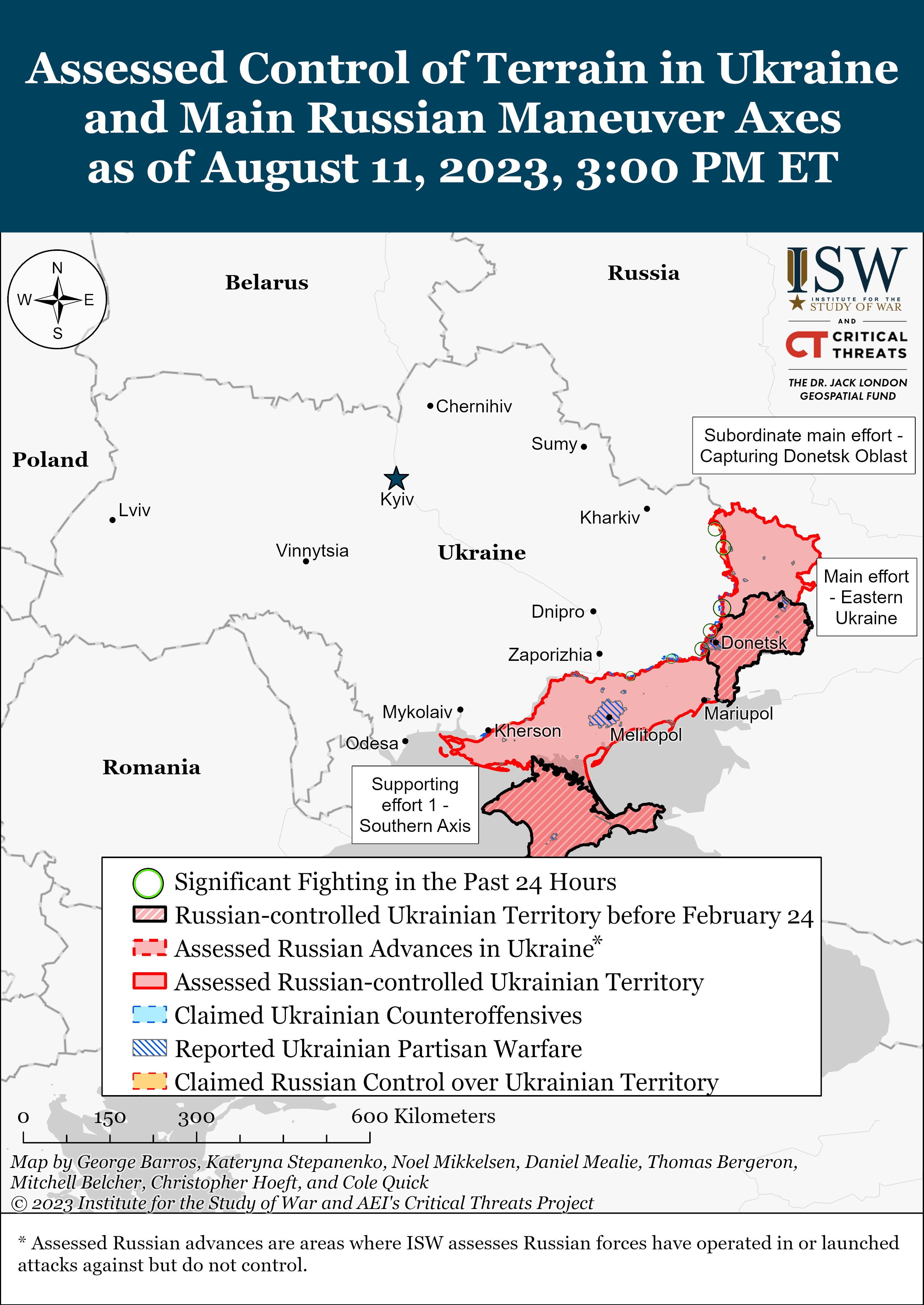
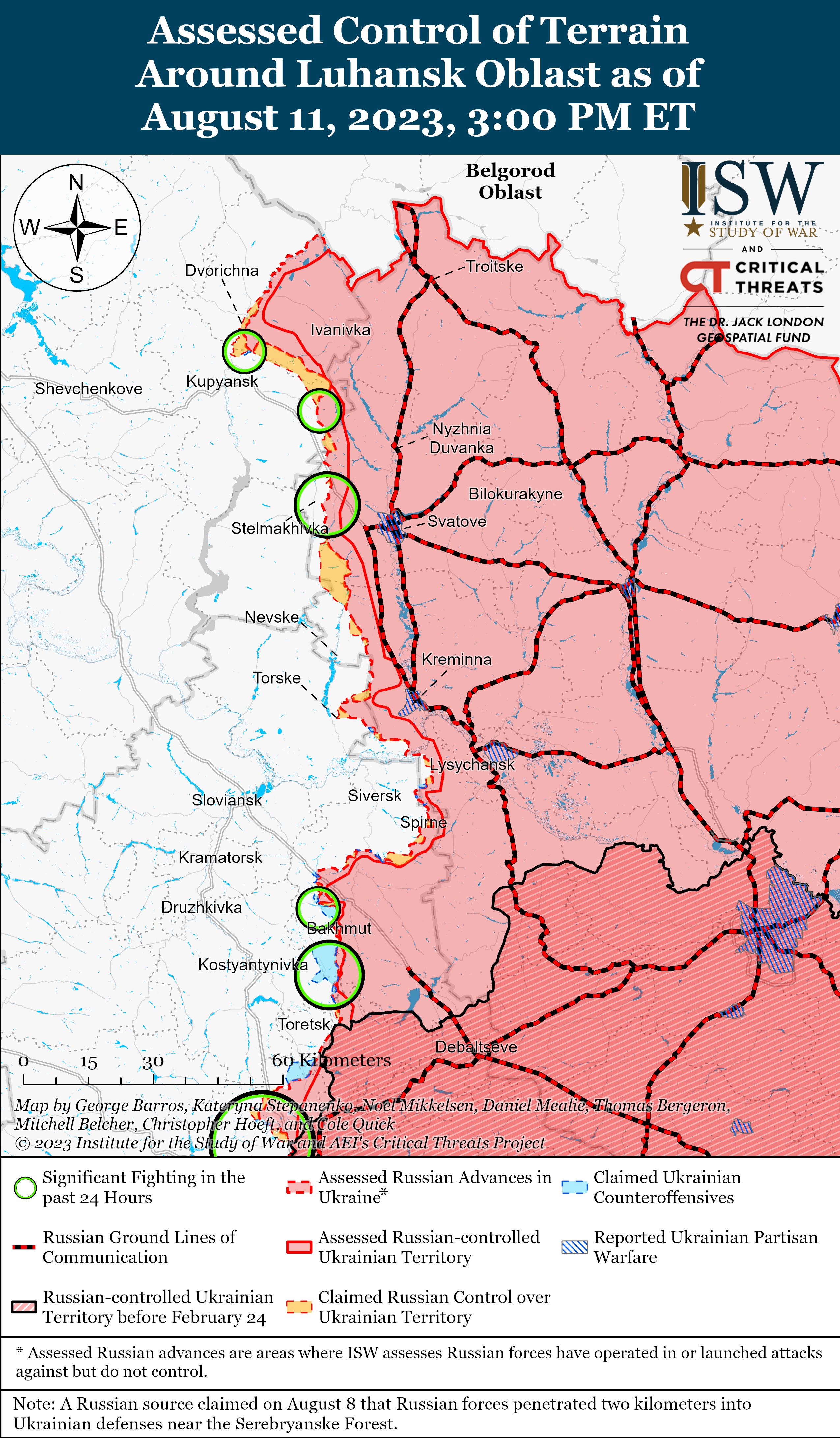
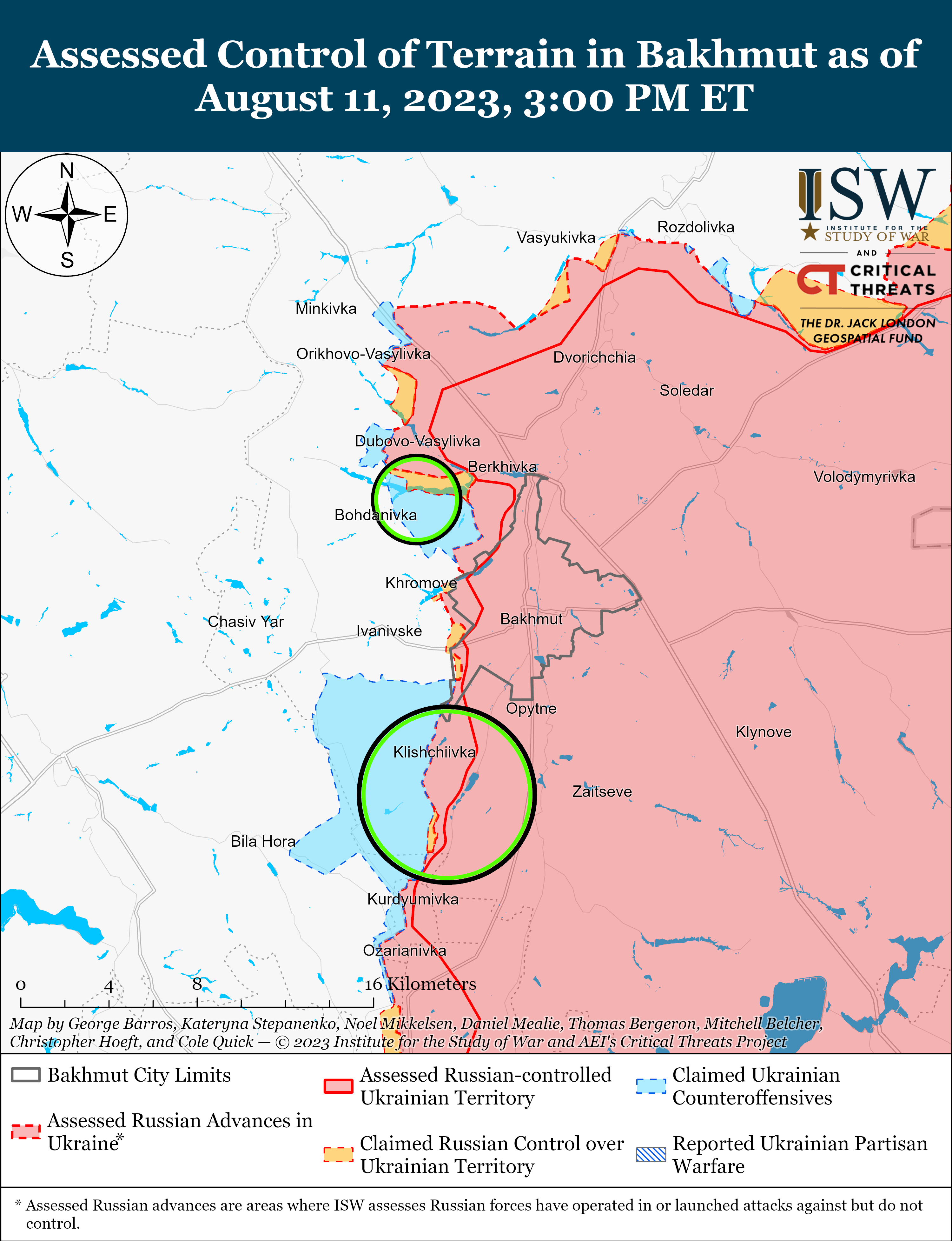
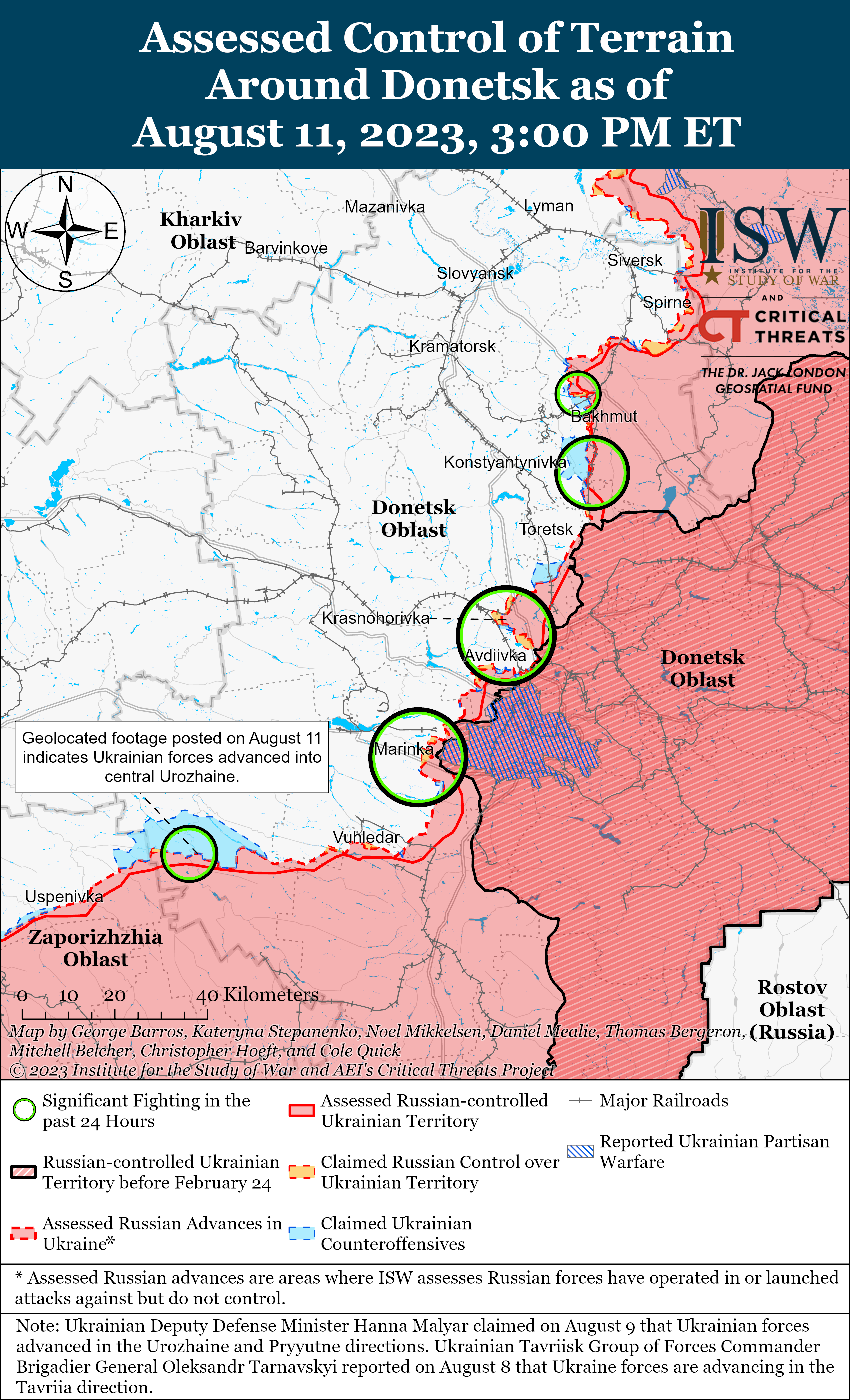
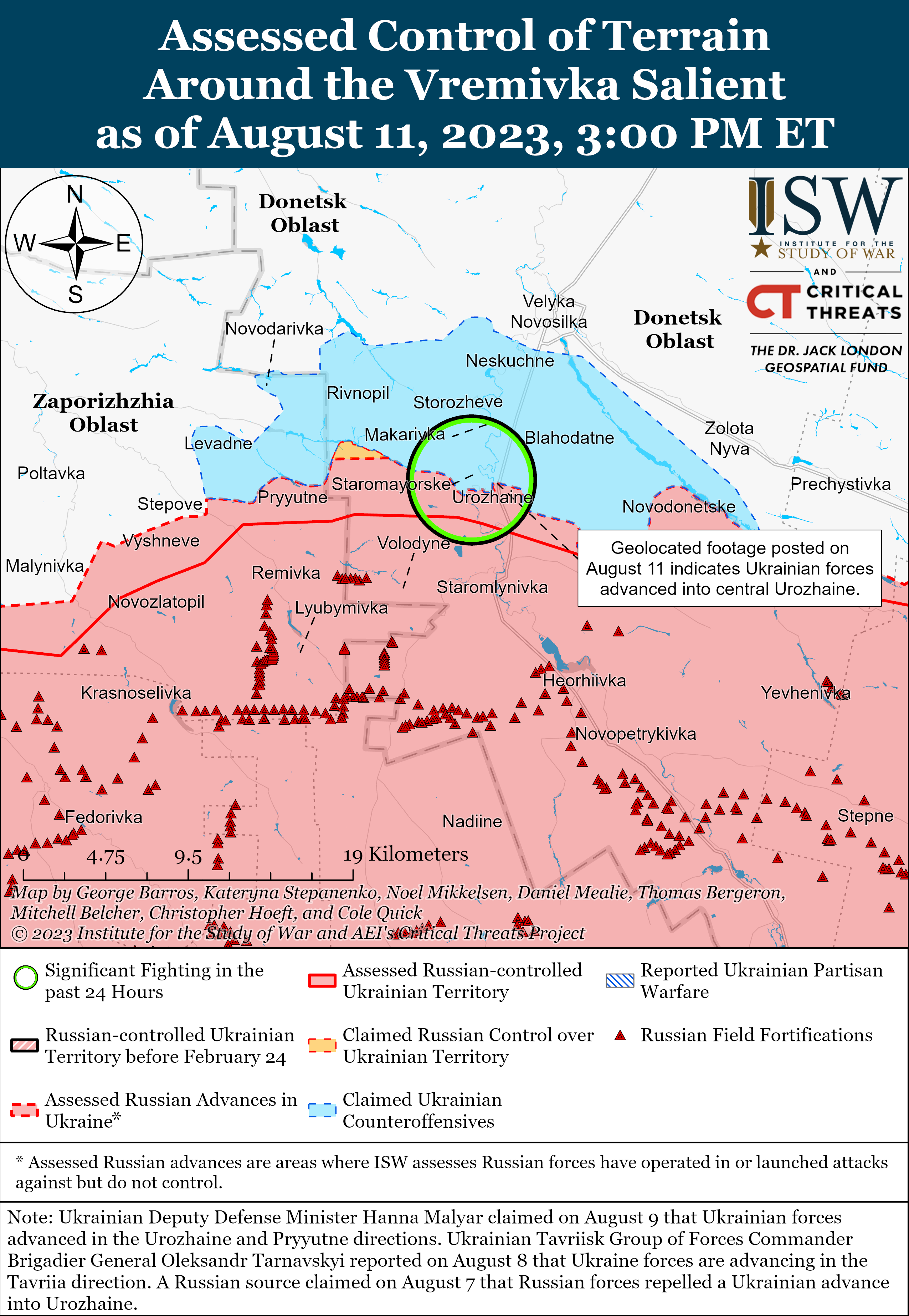
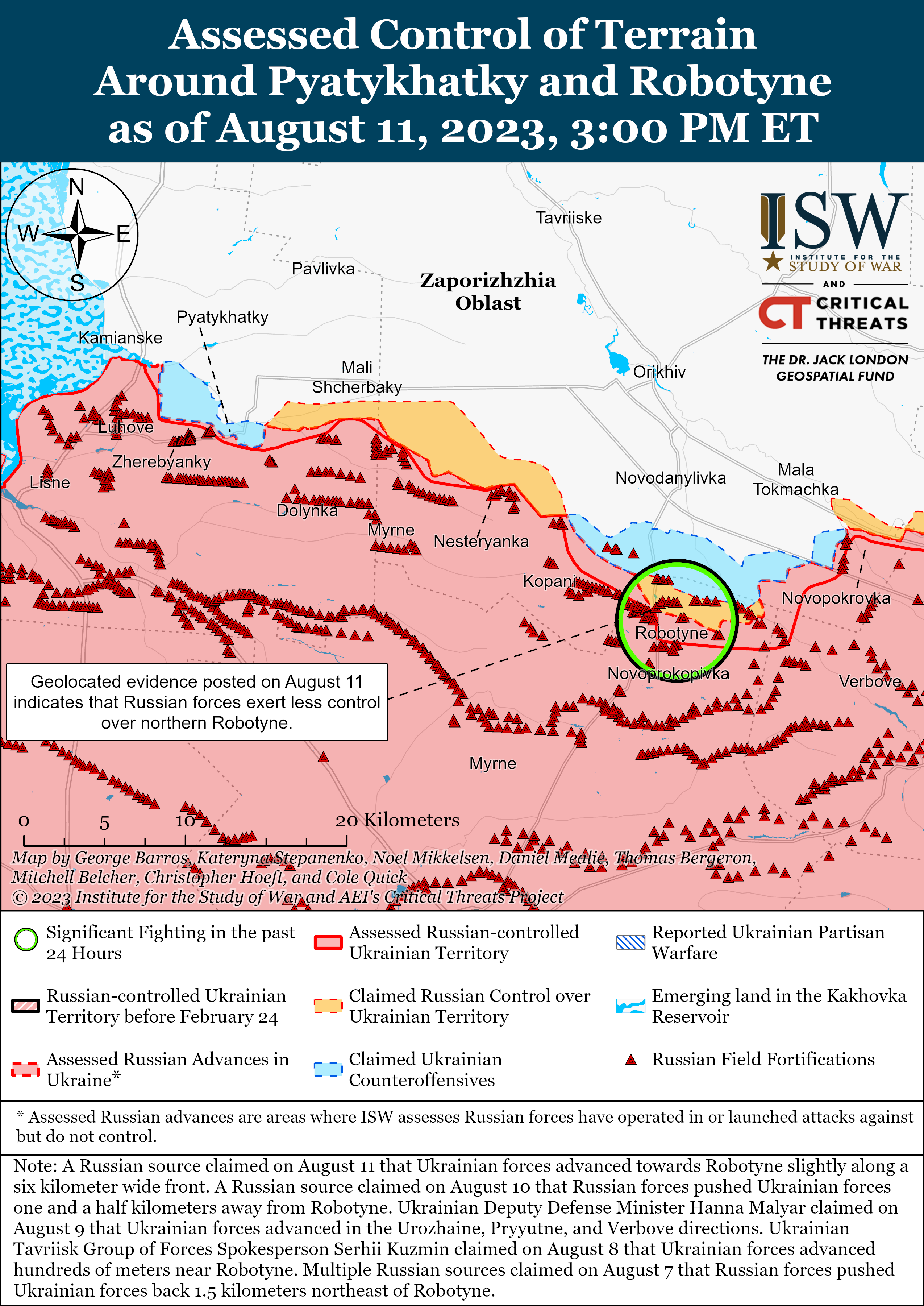
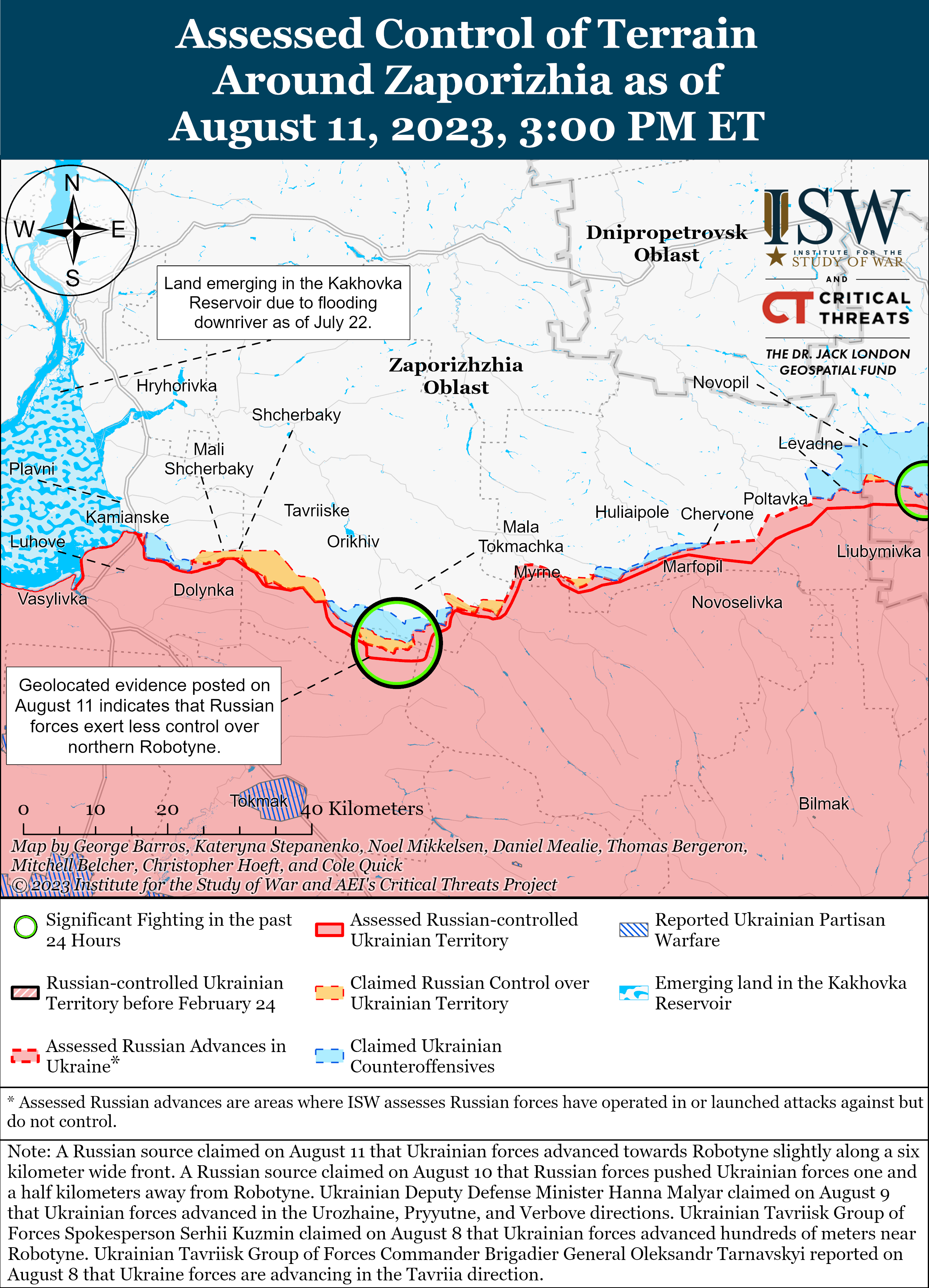
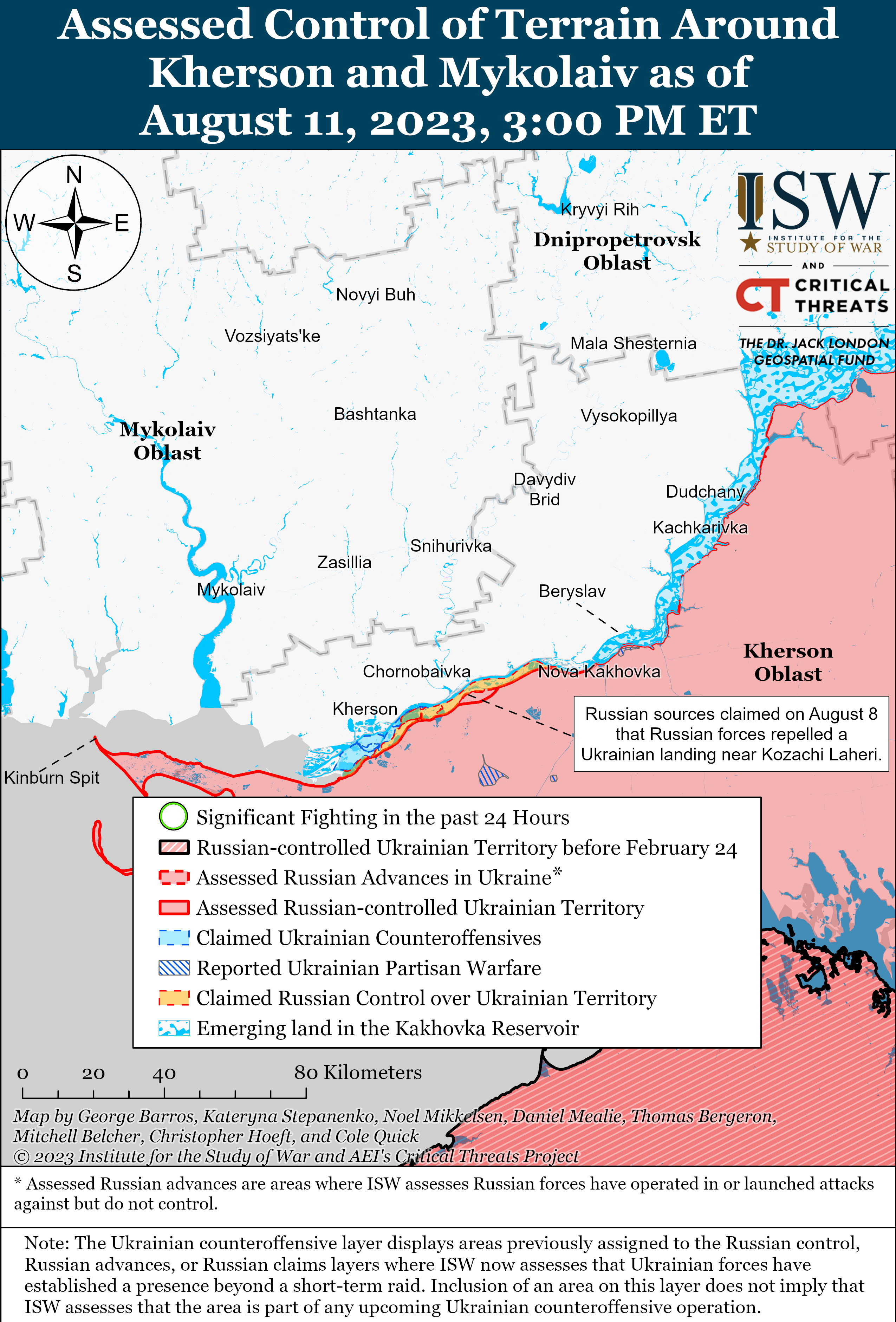
No comments:
Post a Comment